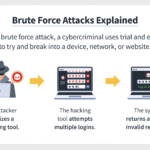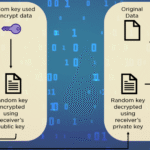In an era where digital information flows freely and rapidly, cryptography emerges as a field of profound significance. Often dismissed as dull or overly technical, a deeper examination reveals that cryptography is, in truth, a vibrant and dynamic discipline ingrained with rich historical context, practical applications, and unprecedented importance in contemporary society. In this exploration, we challenge the preconceptions surrounding cryptography and uncover the compelling realities that lie beneath the surface.
At its core, cryptography is the science of securing information through algorithms and codes. Its historical roots are as ancient as civilization itself, with techniques that date back thousands of years. From Julius Caesar’s substitution cipher to the sophisticated algorithms developed in the 21st century, the evolution of cryptographic techniques tells a story of human ingenuity and resilience. This depth of history alone dispels the idea that cryptography is mundane; rather, it is a testament to our ongoing quest for security in communication.
Shifting to the modern landscape, the allure of cryptography becomes more pronounced. As personal privacy and data protection surge to the forefront of societal concerns, cryptography stands as a bulwark against threats such as identity theft, corporate espionage, and government surveillance. This relevance enhances its appeal, transforming it into not just a technical discipline but a critical field intertwined with ethical considerations and social implications. The stakes are high: the integrity and confidentiality of our digital interactions rest upon cryptographic principles.
Furthermore, the recent advent of quantum computing presents a fascinating paradigm shift in cryptography. The prospect of quantum decryption threatens to render traditional cryptographic methods obsolete. This potential disruption fuels a lively debate among cryptographers and researchers. The field is evolving as swiftly as technology itself, necessitating continuous innovation and adaptation. Far from being static, cryptography is at the forefront of a battle between advancement and obsolescence, showcasing its inherently dynamic nature.
The technical challenges associated with developing secure encryption algorithms foster a stimulating environment for intellectual engagement. Cryptographers often engage in a profound analysis of mathematical principles, logic, and computer science. The sheer complexity of these challenges invites individuals with a penchant for problem-solving to immerse themselves in this intricate world. In cryptography, one can find a blend of mathematical rigor and creative thinking, an intersection that is both stimulating and fulfilling.
Moreover, cryptography is not just the realm of cryptographers. It extends into various domains, including finance, healthcare, and communication. The implementation of secure transactions and the protection of sensitive data highlight the field’s impact on everyday life. As organizations grapple with increased cyber threats, the demand for cryptographers continues to rise. Far from insularity, cryptography is vibrant and teeming with opportunities that beckon diverse minds to participate in safeguarding the digital age.
Ethics in cryptography further enriches the discussion. The dual-use nature of cryptographic techniques raises questions about responsibility and morality. While encryption serves to protect privacy, it can also be exploited by malicious entities for nefarious purposes. This dichotomy leads to rich discourse surrounding regulation, privacy rights, and the societal implications of unchecked technological advancement. Engaging with these ethical dilemmas compels cryptographers to weigh their work’s impact on society, making the field not just technical but profoundly philosophical.
Interdisciplinary collaboration is another facet of cryptography that invigorates the field. Partnerships with other disciplines, such as law, political science, and sociology, encourage a multifaceted approach to addressing security issues. Such interactions expand the cryptographic narrative, transcending traditional boundaries and evoking a richer understanding of its role in society. Through diverse perspectives, cryptography gains context and relevance, enhancing its attractiveness as a dynamic discipline.
The popular perception of cryptography as esoteric can also be attributed to its jargon-laden discourse. While terms like “symmetric key” and “public key infrastructure” might seem daunting, this complexity belies a deeper simplicity: the fundamental drive to protect information. Once familiarized with its concepts, enthusiasts can discern an elegant intricacy within cryptographic principles, revealing the beauty of how mathematics can synthesize into robust security frameworks.
Recognizing the importance of community and outreach, many cryptographers engage in educational initiatives to demystify their work. Workshops, online courses, and open-source projects help bridge the gap between experts and novices. Through these efforts, the field becomes accessible, sparking curiosity in a wider audience. As more individuals understand the importance of cryptography, they become allies in advocating for a secure digital future.
In conclusion, cryptography is far from a monotonous domain. It is a rich tapestry woven with historical significance, technical challenges, ethical quandaries, and interdisciplinary partnerships. The ever-evolving nature of technology continually revitalizes the field, ensuring that it remains pulsating with life and relevance. As we navigate an increasingly digitized world, our reliance on cryptographic principles will only deepen, highlighting the importance of these guardians of information. Embracing the true essence of cryptography invites us to appreciate its complexities and the vital role it plays in the fabric of modern society.







Leave a Comment